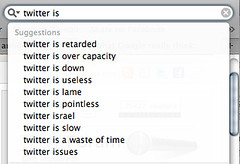![]() Image via CrunchBase
Image via CrunchBase
Entitled "Obama, Lehman and the 'Dragon Tattoo', it's an indictment of the Wall Street robber barons via Stieg Larsson's best-selling book.
http://www.nytimes.com//2010/03/21/opinion/21rich.html
Here's the key passage:
"'A bank director who blows millions on foolhardy speculations should not keep his job,' writes Larsson in one typical passage. 'A managing director who plays shell company games should do time.' Larsson is no less lacerating about influential journalists who treat 'mediocre financial whelps like rock stars' and who docilely 'regurgitate the statements issued by C.E.O.'s and stock-market speculators.' He pleads for some 'tough reporter' to 'identify and expose as traitors' the financial players who have 'systematically and perhaps deliberately' damaged their country's economy 'to satisfy the profit interests of their clients.'"
Where are those tough reporters? Lapping up the spin of Timothy Geithner's public relations team?
"Geithner's major calling lately has been a public-relations tour, with full-dress profiles in The New Yorker, The Atlantic and even Vogue, which filled us in on his humble 'off-the-rack' Brooks Brothers suits. Last week he also contributed a video testimonial to the on-air fifth anniversary celebration of Jim Cramer's 'Mad Money.' Like the heedless casino culture it exemplified, that CNBC program has long been back to speculative business-as-usual, pumping stocks as if the crash were just a small, inconvenient bump on the road to larger profits and bonuses."
Then I turn to the Style section of the "Times" and find Patti Smith on its cover, in a dress.
Who gives a shit about Patti Smith?
The "New York Times", that's who. A bunch of self-congratulatory tastemakers who have paraded the work of this third rate artist ad infinitum for decades, even more so now, even though she hasn't done a worthwhile thing since the seventies.
I bought all the albums, save me the hate mail.
The point is, the papers are skewed.
I know, I know, it's complicated. I'm quoting Frank Rich at the same time I'm decrying the paper's efforts... But my point is, we've been dictated to by the mainstream press for years, have you ever questioned whether their viewpoint is accurate?
Take the Michael Jackson Sony deal...
I received the following e-mail from a powerful music business attorney:
"Have you seen that crap about the Michael Jackson deal? It's everything you talk about in lazy mainstream media reporting.
I've had 2 reporters call me and they seem to have no skepticism at all. I mean, I know it's more than a record deal, but if it's primarily based around records, they'd have to sell more than 50 million to come out of the deal--that will only happen in this market if Michael dies again.
Then in every report, you read about how Sony sold 31 million MJ records last year, 'almost 2/3 of them overseas.' So you check US Soundscan (which a few reporters actually did), and it's 8.3 million units (according to those reports). Multiply that by 3 and you get 31 million? Not in my math class. These guys are so lazy they can't even multiply.
Like I keep telling the reporters, every deal I've ever done that I've read about is wrong, so why should this one be right? Besides, I've inherited deals that Branca did and were reported at about 3 times what they turned out to be when I finally saw the contracts."
Whew!
The Internet is just a constant warning that the old players want to keep their cash cows, want no questions asked, believe they're entitled to their money.
One can argue that Stieg Larsson wasn't first, but a public that rebelled against a major label system that overcharged them for nine tracks they didn't want in order to get the one they did.
People are just as pissed about Wall Street. Unfortunately, it's a bit tough for many to comprehend. But maybe reform isn't as distant as the mainstream believes, as long as bloggers and those in the know online keep hammering away, revealing the truth.

![Reblog this post [with Zemanta]](http://img.zemanta.com/reblog_e.png?x-id=d6bb596d-79eb-4d63-b581-48741573d0ee)

![Reblog this post [with Zemanta]](http://img.zemanta.com/reblog_e.png?x-id=61a2964d-535e-499a-b3d6-ff3adb0eaef4)

![Reblog this post [with Zemanta]](http://img.zemanta.com/reblog_e.png?x-id=9731cf30-dbc7-4bd3-ba9f-0297ec24d39e)

![Reblog this post [with Zemanta]](http://img.zemanta.com/reblog_e.png?x-id=f9061f55-767b-424f-8fda-a3f1336fc5ac)





